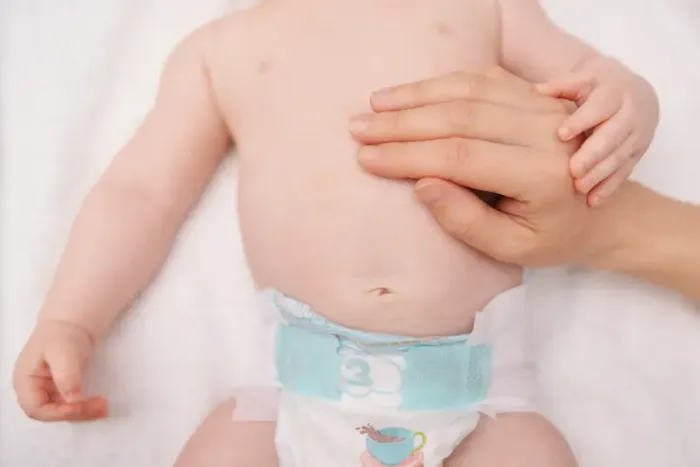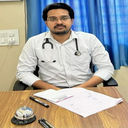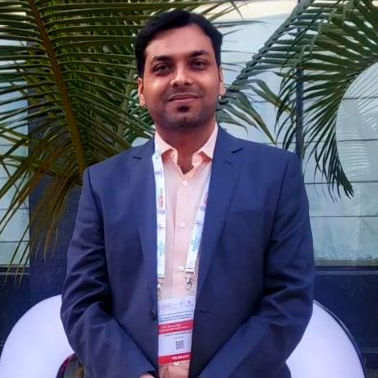Omphalocele: Overview of Causes and Treatment
Omphalocele is a rare birth defect where abdominal organs protrude through a newborn’s belly button. Learn about its causes, diagnosis, treatment, and care tips for parents.

Written by Dr. Rohinipriyanka Pondugula
Reviewed by Dr. Vasanthasree Nair MBBS
Last updated on 21st Aug, 2025

Omphalocele: Overview of Causes and Treatment
Welcoming a newborn is a joyous occasion, but sometimes, babies are born with certain conditions that require special care. One such condition is omphalocele, a rare birth defect that affects the abdominal wall. If your baby has been diagnosed with omphalocele, you may have questions and concerns. This article aims to provide clear, compassionate, and helpful information about the condition, its causes, and treatment options.
What is Omphalocele?
Omphalocele (pronounced om-FAL-oh-seel) is a congenital (present at birth) condition where a baby’s intestines, liver, or other abdominal organs protrude outside the body through an opening in the belly button area. These organs are covered by a thin, transparent sac.
Unlike gastroschisis (another abdominal wall defect where organs are exposed without a protective sac), omphalocele has a covering membrane. The size of the omphalocele can vary—some are small, containing only a portion of the intestine, while larger ones may include multiple organs.
What Causes Omphalocele?
The exact cause of omphalocele is not always known, but it occurs during early pregnancy when the baby’s abdominal wall does not form properly. Some factors that may increase the risk include:
1. Genetic Conditions – Babies with chromosomal abnormalities like Down syndrome (Trisomy 21), Edward syndrome (Trisomy 18), or Patau syndrome (Trisomy 13) are more likely to have omphalocele.
2. Maternal Factors – Certain habits or conditions in the mother may contribute, such as:
• Smoking or alcohol use during pregnancy.
• Obesity.
• Use of certain medications (always consult a doctor before taking any medication during pregnancy).
3. Environmental Factors – Exposure to toxins or infections during pregnancy may play a role.
How is Omphalocele Diagnosed?
Omphalocele is often detected before birth through routine prenatal ultrasounds, usually around the second trimester. If an omphalocele is suspected, doctors may recommend further tests, such as:
• Fetal MRI – To get a clearer image of the baby’s organs.
• Amniocentesis – To check for genetic conditions.
• Echocardiogram – Since babies with omphalocele may also have heart defects.
If not detected prenatally, omphalocele is immediately visible at birth.
How Does Omphalocele Affect a Baby’s Health?
The impact of omphalocele depends on its size and whether other birth defects are present. Possible complications include:
• Breathing difficulties (if organs push against the lungs).
• Infection risk (since the protective sac can tear).
• Digestive issues (if intestines are affected).
• Associated conditions (heart defects, genetic disorders).
Babies with small omphaloceles often recover well after treatment, while those with larger ones or additional health issues may need long-term care.
Consult Top Specialists
Treatment Options for Omphalocele
Treatment depends on the size of the omphalocele and the baby’s overall health.
1. Immediate Care After Birth
• The exposed organs are covered with a sterile, moist dressing to prevent infection and dehydration.
• The baby is placed in a neonatal intensive care unit (NICU) for close monitoring.
2. Surgical Repair
• Small omphaloceles – Surgery is usually done soon after birth to place the organs back inside the abdomen and close the opening.
• Large omphaloceles – If the baby’s abdomen is too small to hold all the organs at once, a staged repair is done. A special mesh or silo is placed over the organs, and gentle pressure is applied over days or weeks to gradually push them back inside before final closure.
3. Non-Surgical Management (for very large omphaloceles)
• Conservative treatment (painting the sac with antiseptic and letting skin grow over it naturally).
• Delayed surgery (waiting until the baby grows bigger).
Recovery and Long-Term Outlook
With proper medical care, many babies with omphalocele go on to live healthy lives. However, some may experience:
• Feeding difficulties (requiring special formulas or feeding tubes).
• Hernias (weakness in the abdominal wall).
• Growth delays (if other genetic conditions are present).
Regular follow-ups with pediatric surgeons, nutritionists, and other specialists are essential.
How Can Parents Support Their Baby?
• Follow medical advice – Stick to the treatment plan provided by doctors.
• Ensure proper nutrition – Some babies need fortified breast milk or special formulas.
• Watch for infections – Keep the surgical site clean and monitor for fever or unusual swelling.
• Seek emotional support – Joining support groups for parents of children with birth defects can be helpful.
Can Omphalocele Be Prevented?
Since the exact cause is often unknown, prevention is not always possible. However, mothers can reduce risks by:
• Taking prenatal vitamins (especially folic acid before and during pregnancy).
• Avoiding smoking, alcohol, and harmful medications.
• Maintaining a healthy weight.
• Getting regular prenatal checkups.
When to Seek Help?
If you are pregnant and an ultrasound detects an omphalocele, consult a pediatric surgeon or a high-risk pregnancy specialist to plan the best care for your baby.
If your baby is born with an omphalocele, immediate medical attention is crucial.
Need Expert Advice?
If you have concerns about omphalocele or need guidance, you can book a consultation with a pediatric specialist through Apollo 24|7. Early intervention ensures the best possible outcome for your child.
Final Thoughts
An omphalocele diagnosis can be overwhelming, but with advances in medical care, many babies recover well. The key is early detection, expert treatment, and ongoing support. Stay informed, follow your doctor’s advice, and remember—you are not alone in this journey.
Consult Top Specialists
Consult Top Specialists

Dr. Guruprasad N
Paediatrician
7 Years • MBBS, MD Peadiatrics, DNB pediatrics
Bangalore
Apollo Clinic Bellandur, Bangalore

Dr. Akhila Hb
Paediatrician
10 Years • MBBS, MD ( PAEDIATRICS), Fellowship in Asthma and Allergy
Bengaluru
Apollo Medical Center, Marathahalli, Bengaluru
(50+ Patients)

Dr. Anveez M A
Paediatrician
6 Years • MBBS,MD
Bansdroni
Siddhita Healthcare., Bansdroni

Dr. Dikpati Mukherjee
Paediatrician
12 Years • MBBS, MD (Paed.)
Kolkata
MCR SUPER SPECIALITY POLY CLINIC & PATHOLOGY, Kolkata
Dr. J N V. Bhuvaneswararao
Paediatrician
24 Years • MBBS,Diploma in Child Health
Vijayawada
SRI SRINIVASA CHILDRENS HOSPITAL, Vijayawada
Consult Top Specialists

Dr. Guruprasad N
Paediatrician
7 Years • MBBS, MD Peadiatrics, DNB pediatrics
Bangalore
Apollo Clinic Bellandur, Bangalore

Dr. Akhila Hb
Paediatrician
10 Years • MBBS, MD ( PAEDIATRICS), Fellowship in Asthma and Allergy
Bengaluru
Apollo Medical Center, Marathahalli, Bengaluru
(50+ Patients)

Dr. Anveez M A
Paediatrician
6 Years • MBBS,MD
Bansdroni
Siddhita Healthcare., Bansdroni

Dr. Dikpati Mukherjee
Paediatrician
12 Years • MBBS, MD (Paed.)
Kolkata
MCR SUPER SPECIALITY POLY CLINIC & PATHOLOGY, Kolkata
Dr. J N V. Bhuvaneswararao
Paediatrician
24 Years • MBBS,Diploma in Child Health
Vijayawada
SRI SRINIVASA CHILDRENS HOSPITAL, Vijayawada